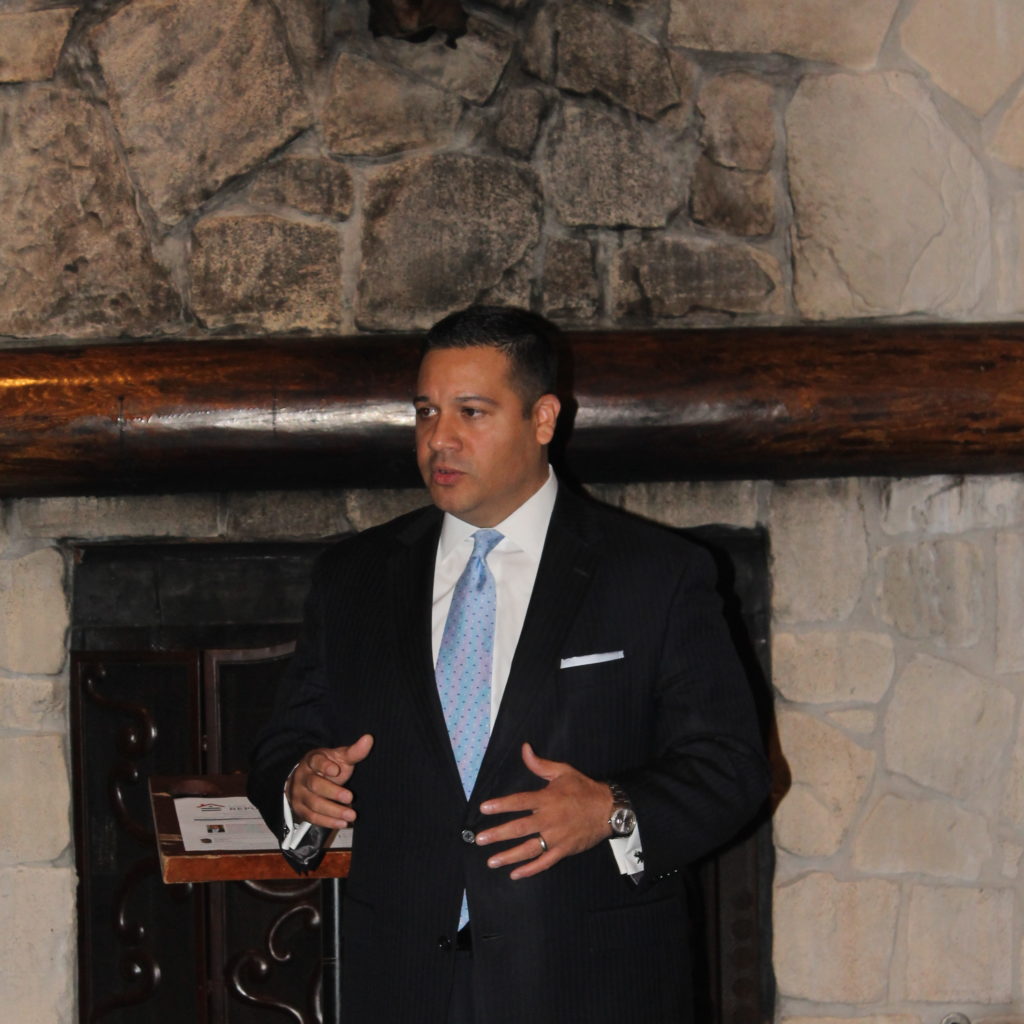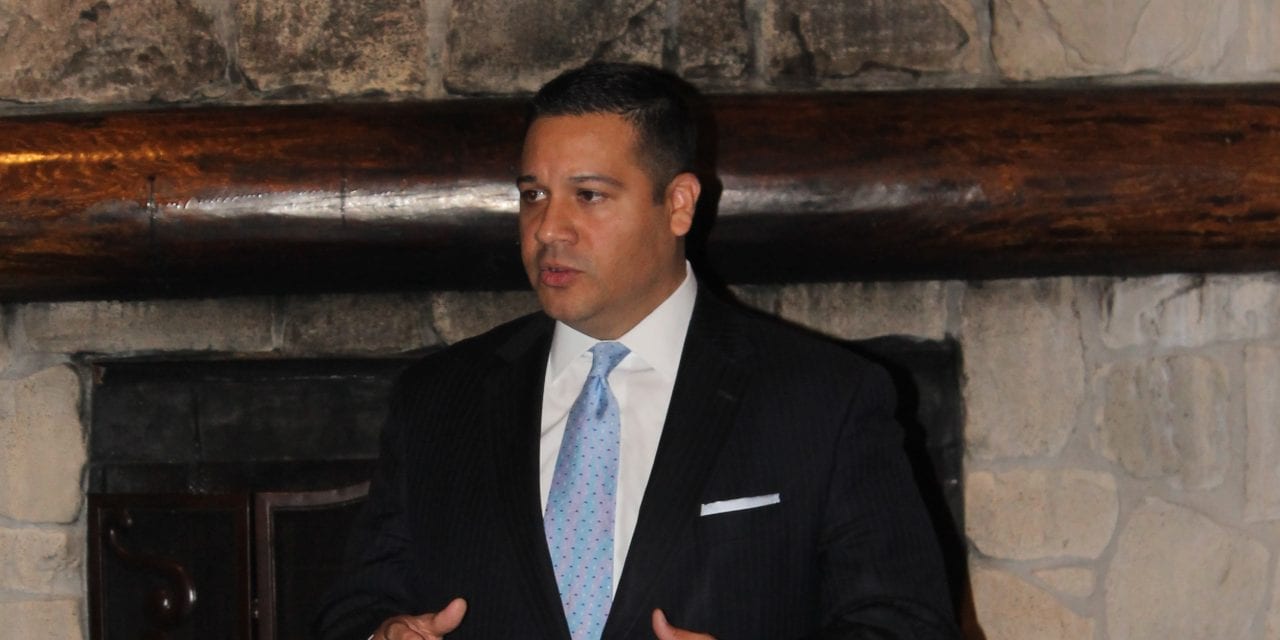
State Rep. Jason Villalba speaks at a Log Cabin Republicans of Dallas meeting Tuesday. (Anna Waugh/Dallas Voice)
Dallas Republican Jason Villalba just completed his freshman year in the state House, managing to finish the session with a D-minus on Equality Texas’ Legislative Scorecard.
Villalba was one of only three freshmen Republicans to score above an F on the scorecard. Gatesville’s J.D. Sheffield also got a D-minus, and Austin’s Tony Dale got a D.
Villalba discussed the session Tuesday at the Log Cabin Republicans of Dallas’ June meeting, focusing on education, transportation and water conservation. But he talked LGBT issues with Dallas Voice before the meeting.
His Equality Texas score resulted from his voting to table two amendments affecting the LGBT community and voting against Republican Matt Krause’s discriminatory amendment.
He said he also opposed the anti-gay bill by Drew Springer, R-Muenster, that would have defunded school districts that offered domestic partner benefits.
“I believe strongly that in Texas we need to keep the government out of our private lives and I want to make sure that we do that,” he said. “With respect to an issue like that, it’s a very sensitive topic. I think with respect to state money, we need to give that some very deep consideration.”
Asked if he supports offering DP benefits, he said it should remain a local control issue.
“I believe for private corporations, that if they want to provide benefits for same-sex partners, that that should be within their ability. I believe with respect state government agencies — agencies that receive federal resources or state resources — that should be up to the city or that should be under local control,” Villalba said. “I don’t believe the state of Texas should be making those kinds of decisions. I think that should be left to the local groups. If [Springer’s] local school district or local community wants to provide it, they should be able to do that. But if they want to prohibit that, they should be able to do that.”
Villalba remained firm in his opposition to any kind of discrimination, but wouldn’t commit to backing the statewide version of Employment Non-Discrimination Act to protect against discrimination on the basis of sexual orientation or gender identity. The bill was filed this past session in the House and Senate, but never made it out of committee.
“I don’t like to weigh in on bills that haven’t come before me,” he said. “Conceptually, philosophically, I don’t believe in categorizing people by race, ethnicity, sexual orientation, religion. That being said, as a legislator, I know that the devil truly is in the details and unless I can see and shape and weigh in on what the actual legislation states, it’s very difficult to say today I would sign on. I don’t do it for ultra conservative groups and I wouldn’t do it for other groups.”
Villalba seemed perfectly comfortable discussing issues until same-sex marriage came up, then things became sticky. He said his district was in support of Texas’ constitutional marriage amendment that passed in 2005, and his opinion would change only if his constituents’ minds changed.
“I believe that marriage is a creature of the state and the state is comprised of its people. I believe that in 2005 when we put this question to the people of Texas, it overwhelmingly passed. Marriage is between one man and one woman,” he said. “I’ll maintain that position until the people speak in a different direction and then if the people in my district or county change their minds, at that point I’ll readdress it. But I do believe that that’s a question for the people to answer, not for legislators to answer.”
But does he support same-sex marriage personally?
“Well, personally, (pause) look, that’s a dangerous question for me to answer. I am against any kind of discrimination based on sexual orientation. I don’t like it when governmental authorities at any level — local, state, federal — stand in the way of an individual’s rights based on sexual orientation, so that’s what I’m for,” he said. “Whether or not that means marriage falls within the context — ‘is that discrimination?’ That’s a question again I’d have to look at in the context of what the request would be because if you’re telling me that that’s discrimination then I’d have to look at what it means to be discrimination. For instance, does an individual have all the rights of marriage without the certificate from that state? If that’s the case, then I don’t believe that’s discrimination.”
When it was pointed out that his example of having rights without the license wasn’t true in Texas, he responded, “Well, I don’t know.”
After mentioning the upcoming U.S. Supreme Court decisions and recent national momentum toward marriage equality and when Texas should revisit the amendment, Villalba said the state is still against same-sex marriage and said voters had decided recently (eight years ago) to add the amendment. But he remained firm in stating that he votes the will of his district on any issue.
“You’re seeing in other states, it is beginning to change, but I can tell you Texas remains quite conservative on this issue. I know that when I get phone calls from my district, consistently they are against it,” he said. “I also vote my district. If I get 10 calls to one on this issue, then that tells me something. Now, conversely, if there comes a time when I get 10 calls to one in the other direction, I’ll have to reconsider it. And it’s at that time when I think we begin to readdress this issue.
“But I can tell you from knocking on doors and walking around the neighborhoods where I live, I think people remain against changing the definition of marriage in Texas and that’s my position today. I’m against it. That doesn’t mean there won’t come a time when that can change, but that’s, I think, only when people speak to me and tell me that’s what we want to do.”











